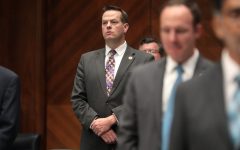
Voting Day (Photo: Element5 Digital)
AZ Abortion Battle Heats Up over ‘Unborn Human Being’ Wording
Maricopa Superior Court Judge to review suit by abortion group to strike phrase
By Steve Kirwan, July 25, 2024 11:09 am
Maricopa County Superior Court Judge Christopher Whitten agreed to hear arguments over the inclusion of the term “unborn human being” in the Proposition 139 ballot pamphlet language explaining the impact of its passage. If passed, Prop 139 would add abortion rights to the Arizona constitution. Arizona Democrats, acting through the ultra-left group Arizona for Abortion Access, filed the suit because of language in the voter pamphlet. The Proposition’s inclusion on the ballot is not at risk.
The Arizona Globe initially reported on the lawsuit on July 12, 2024, but the court had not yet agreed to hear the new case. Abortion Access will argue that the Legislative Council, appointed by the party in charge (Republican in this case), acted illegally by including the term “unborn human being” in the voter pamphlet. The suit alleges that using that phrase is prejudicial against the measure. They want Juge Whitten to force the Council to use the word “fetus” instead.
Attorney Andrew Gaona, who represents Arizona for Abortion Access, will argue that the decision to use the phrase is “tinged with partisan coloring.” He will state that it is because pro-life groups often use it to influence women considering abortion. However, the legislature’s attorney, Kory Langhofer, is expected to argue the inverse, claiming that the term “fetus” is equally politically charged because it dehumanizes the unborn child. He claims that the suit should be dismissed on its merits, arguing that the term “unborn human being” was lifted from the existing Arizona law allowing abortion through the 15th week.
“An analysis that describes relevant existing laws by quoting them verbatim is the quintessence of an impartial summary,” Langhofer said. He will argue that overriding the existing language would require a full Legislative Council analysis on the entire issue of abortion. With the legislature currently out of session, such analysis would be all but impossible and still meet the election timeline.
Gaona will argue that “unborn human being” is not a medically accepted term and will call Dr. Patricia Habak, an obstetrician and gynecologist, to testify as such at the hearing and that the proper terminology would be “fetus” or “embryo.”
Langofer responded, “To the extent there is an external reference point for gauging an analysis’ impartiality, it is the perspective of a voter, not a physician, that controls.” He added that state law requires a description be written “in clear and concise terms avoiding technical terms whenever possible.”
Democrats on the Legislative Council also filed a separate objection on Tuesday. Their case states, “Describing a fetus as an ‘unborn human being’ is a rhetorical strategy used by the Republican legislator defendants (on the council) to attempt to sway voters rather than meet the statutory requirement of impartiality.” The filing continued, “Words matter, and these words were clearly meant to bring more than a hint of partisan coloring. They were meant to provoke an emotional or visceral reaction that cannot comply with the statute’s requirement for impartiality.”
It’s unlikely Judge Whitten’s ruling will be the final word. Both sides indicated that if the decision goes against them, they will escalate the case to the Arizona Supreme Court.
- Kavanagh, Petersen Lead 2026 Budget Battles - January 12, 2026
- Arizona Globe’s Top Stories of 2025 - January 1, 2026
- Hobbs, Robson and Schweikert Duke it Out in AZ Gov Primary - December 30, 2025




